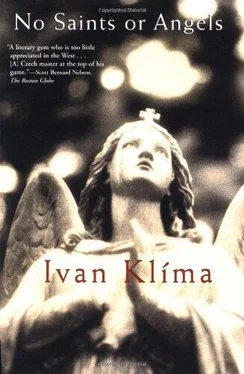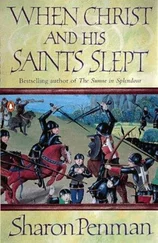From the age of seven I had to attend violin lessons three times a week, as well as practise at home. My teacher used to praise me and once told me that I was her best pupil. So I started to consider the possibility of becoming a violinist. For a while the idea of it enchanted me as I imagined myself in a concert hall like the ones I'd seen on television. I'd be dressed in a beautiful evening gown of dark blue velvet and playing Beethoven. I'd play so wonderfully that the conductor would bow to me and kiss my hand, while from doors hidden behind curtains they would bring me baskets of flowers.
I started to practise strenuously. Even though all I had was a mediocre violin, Dad still complained it was too expensive for my 'scraping'.
My playing came to a sorry end. I left my instrument at the post office where Mum had sent me with a letter. There was a queue at the counter so I had put my violin down on a ledge by the wall. The lady in front of me — I can still recall it almost forty years on — must have had about a hundred letters to post and I was terrified of being late for school. So when I'd finally handed mine in I just grabbed my school bag and dashed out; I didn't give a thought to my violin. I rushed back about a quarter of an hour later but my violin was already gone and I arrived at school late.
At school my teacher excused me when she heard what had happened to me, but Dad never forgave me, and Mum spoke up for me in vain. He didn't beat me and didn't even scold me particularly, but he was unmoved by my despair at the loss of the violin. I had committed an unforgivable offence: someone with ambitions to be a violinist doesn't leave his instrument at the post office or on the train and on his deathbed he asks for his violin to be brought to him so that he can caress it with his eyes at least. That was the explanation I received from the father who never once caressed me. I never received another violin, and I had no more lessons.
I could have bought myself a new violin ages ago, but what good would it be to me? I've forgotten everything I knew. These days I wield a dental drill instead of a bow, and it could be that I provide as much or more satisfaction with it when I save someone's tooth or rid them of a toothache — even if I don't garner applause. Instead of flowers they tend to bring me a bottle of booze, a home-made strudel or a banknote in an envelope. One of the nurses from the hospital brings me a set of hypodermic syringes and sometimes she actually brings an ampoule of morphine or Dolsin if she needs my services. I'm sure she steals it all at work. I always refuse them but she just leaves the packet on the table in the surgery and walks out.
Yehudi has finished caressing me. I've always yearned to live with a kind and sensitive man who would know how to caress me, listen to me, protect me and not betray me. The banal dreams of TV soap heroines.
I expect such men don't exist.
And if one did, what hope would I have of meeting him? And if I met him what hope that he'd love me?
I can still hear the music inside me: the main theme from the opening Allegro. I once read about Tchaikovsky somewhere that he tried to overcome all sadness by willpower. As if it were possible to drive the sadness from one's soul. My feeling is that
he increasingly expressed the despair that he tried in vain to suppress. The Pathétique was simply his final cry. I have an affinity for Tchaikovsky. He loved his mother, although he lost her at an early age, and had little praise for his father. He was definitely a sensitive man, and kind too, but being a woman I wouldn't stand a chance with him. Of all the various stories about his sudden death, the one I find most convincing is that he took poison.
My assistant Eva and I call suicide self-extraction, though she herself would never consider such a thing. Pulling oneself out of life. Or casting oneself out?
I married a man who was neither sensitive nor kind. At first he used to caress me but he never listened to me or protected me. And in the end he betrayed me.
I might have suspected it, or ought to have. He betrayed me exactly the same way as he betrayed his first two wives. How many women he betrayed in total I don't know and don't care any more. But I ought to have given it a thought when I first got to know him.
When someone gets used to lying it's hard for them to learn to tell the truth. And someone who manages to desert another will find it easier the second time. It's sheer vanity to think that one has the power to transform one's partner and drive out all the demons from his soul. Why should he desert me, I used to say to myself, seeing that he is old and greying and I am young and beautiful?
Because it's in man's nature. It seemed, wrote Virginia Woolf, that he ruled all, apart from the fog. And yet he raged.
Unhappy Virginia considered that if a woman wanted to be equal to men she would have to go mad or kill herself. She did both. In her fits of madness she apparently used to hear the starlings chattering in Greek. She tried to kill herself by jumping out the window; she also swallowed a hundred veronal tablets, but she was always saved. In the end she had to turn to water for help. And yet she had a fairly easy life as well as, by all reports, a kind and
loving husband. People who have never known soul-rending misery can have no understanding of her grief.
I sip wine and puff away at a cigarette. Maybe I'm still beautiful. Mr Holý, one of my patients, told me I have beautiful hands and said it was a shame they had to hold a drill.
I asked him what he'd have them hold.
'Me, preferably.' He's old, as old as my ex-husband when I first met him. Except that my husband didn't have a paunch; he was a sportsman. Thanks to skiing and tennis he had the physique of a Rodin statue. When he first held me in his arms I felt a thrill I'd never before felt from a mere embrace.
He managed to live with me for twelve years, during two of which he was unfaithful to me, as far as I discovered. Maybe he was unfaithful to me for longer than that but I didn't try to find out. I was always good at netting men, but not at holding on to them; it always seemed to me that I didn't deserve their love. I was never unfaithful to him. I wanted to live in truth. And I wanted our daughter to be able to live in love.
I know that men are like that: they need to conquer. And when they do, they lose interest. But maybe I could have done with a bit more humility. I wanted to live freely even though I was married. From time to time I would dig in my heels and refuse to serve in the manner expected of me. I refused to listen to orders or good advice; I didn't do any shopping or cooking and regaled my husband with sandwiches. I was no worse then he was. What right had he to demand that I take care of him on top of all my other activities? Why couldn't I spend the evening with someone without his supervision? He was incapable of understanding this or accepting it.
The woman he left me for was expected to look after him like a mother, but she ran away from him anyway. Since they discharged him from hospital, he sits in his living room waiting to see how his body will cope now that they've removed almost his entire stomach and he has no one to stroke him or make him a cup of tea.
When I shut my eyes I can see in front of me snow-covered trees, standing like angels with their hands linked above the path. Every year we would make a trip to the mountains. I felt good there. I could breathe freely and I felt it was a joy to be alive.
I was just slightly wary of skiing. He was much better at it than I was.
'Wait for me, don't leave me behind!'
'Life doesn't wait either,' he told me when we reached the bottom. He was well developed and had beautiful arms and legs, but sometimes he was terribly ordinary: a secondary-school teacher and tennis coach who would astound his students with his bons mots and graceful movements.
Читать дальше












